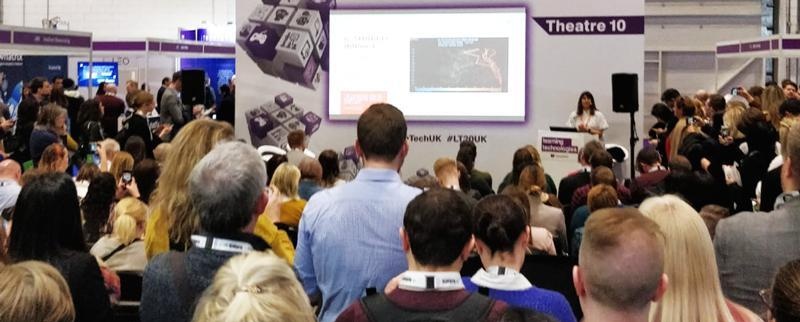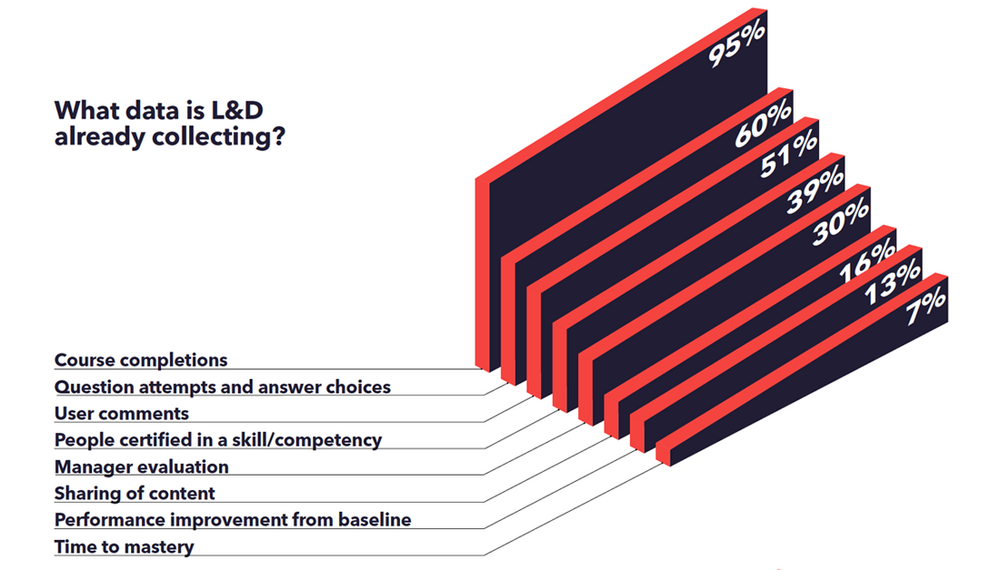'No single data source’ biggest barrier to data collection…

Having ‘no single data source’ makes learner data ‘too complicated to collect’ say 68% of learning industry professionals.
This single biggest barrier was followed by ‘not having built a plan to gather data’, as well as ‘lack of access to internal or external data’ – 45% of people cited each of these as concerns in a live poll at this year’s Learning Technologies conference.

Seminar audience were live polled about their use of data at Learning Tech 2020
A quarter of learning professionals are held back by ‘concerns over privacy and security’, while 14% stated that data is too ‘heavily regulated’ according to over 100 delegates surveyed in the seminar: ‘Six ways to enhance the learning experience using data’ which ran on both days of the two day event held at ExCeL London on 12 to 13 February 2020.

The majority of learning professionals (95%) are capturing ‘course completions’, but for many it ends there. Three in five of those surveyed are collecting ‘question attempts and answer choices’ and half are gathering ‘user comments’. But only 13% of L&D professionals are looking at ‘performance improvement from baseline’ while ‘time to mastery’ was the most underutilised data point with only 7% claiming they currently collect it.

Commenting on the survey findings, LT seminar speaker and Sponge’s Chief Innovation Officer Kate Pasterfield, said, “Learning professionals are already capturing completion data but there’s a real opportunity to make that data work harder. Simply exposing data to learners could improve individual and collective motivation and the achievement of learning goals.”
Tesco’s Learning Leap campaign motivated global employees, working in teams, to complete their training to a deadline for a place on the leaderboard. And Coca-Cola’s Ambassador Hearts Challenge saw teams compete to win hearts to gain a place on a Europe-wide leaderboard, linking knowledge to reward and introducing friendly competition across regions.
“We appreciate that data collection can cause anxiety, particularly around privacy and security, as well as the perceived complexity – the skills, knowledge and resources required. We work in partnership with our clients to make planning for data collection and usage ‘inspiring’ rather than a pain point”, continues Kate.
Having ‘no single data source’ can be solved by making learning content available via a single platform, such as via the LRS feature in our Spark learning platform, powered by Bolt. We work with our clients to produce email digests which capture data from disparate sources such as Zendesk, the LMS and SurveyMonkey to create a single snapshot”, explains Kate.
"Interrogating question attempts and answer choices – data currently being captured by 60% according to the poll – is a great way to expose learner behaviour and to uncover actionable insights" Tamlin Roberts, CEO at Bolt Learning.
CEO of Sponge’s sister company Bolt Learning, Tamlin Roberts, added, “Interrogating question attempts and answer choices – data currently being captured by 60% according to the poll – is a great way to expose learner behaviour and to uncover actionable insights. For example, our Spark platform exposed a knowledge gap amongst a UK retailer’s 13,000 employees regarding the sale of age-restricted items other than alcohol.
By introducing a specific interaction to plug this gap, we were able to help them reduce the number of fines for regulatory non-compliance, as well as improving the handling of challenge situations in stores.”
Kate continues, “User comments are helpful in identifying people that could be used as advocates or influencers. Our award-wining work on AstraZeneca’s Code of Ethics and Speak Up campaigns were great examples of this.
Despite being important in employees’ performance journey, our survey findings suggest that time to mastery or competence may be hardest thing to measure in real-time – which explains why so few L&D professionals are doing so today. As more and more systems track data along people’s career paths and sequential learning journeys, we’ll be able to better capture information that supports gathering insights around these measures.”